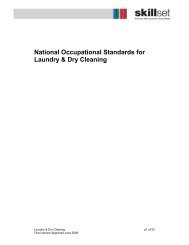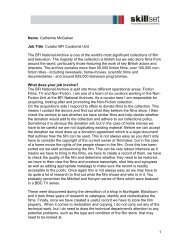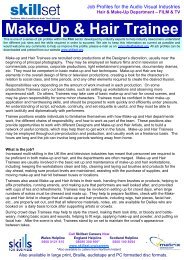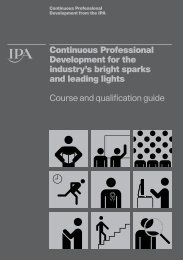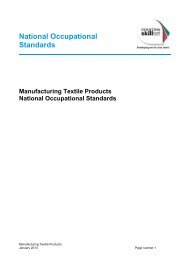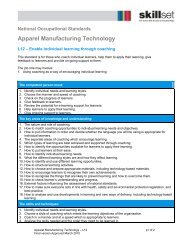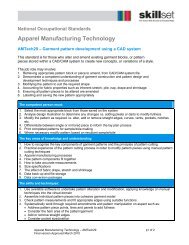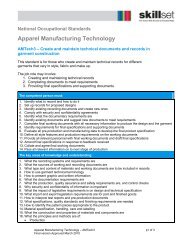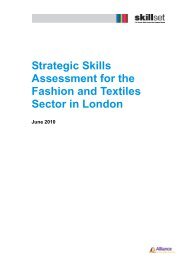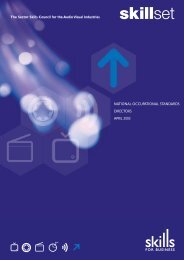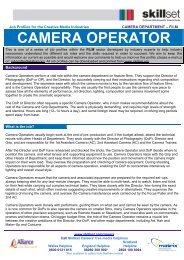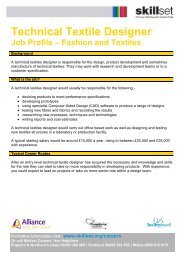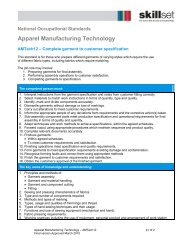CAREER PROFILE CLOTHING ALTERATION HAND - Skillset
CAREER PROFILE CLOTHING ALTERATION HAND - Skillset
CAREER PROFILE CLOTHING ALTERATION HAND - Skillset
You also want an ePaper? Increase the reach of your titles
YUMPU automatically turns print PDFs into web optimized ePapers that Google loves.
Footwear manufacturing<br />
operatives use a range<br />
of handcraft tools and<br />
semi-automated equipment<br />
to create footwear<br />
products. They may<br />
produce many different<br />
types of footwear from<br />
fashion shoes to trainers<br />
and safety footwear.<br />
What does a footwear<br />
manufacturing operative do<br />
A footwear manufacturing operative<br />
will usually be involved in each<br />
stage of the production process.<br />
This includes cutting the leather,<br />
stitching the pattern pieces together<br />
and moulding the shoe into shape.<br />
They would also be involved in<br />
creating a ‘last,’ which is the mould<br />
that the shoe will be formed around.<br />
They would use the last to stitch the<br />
pattern pieces together in the correct<br />
shape, before fitting soles and heels<br />
to the finished product. The shoe<br />
would then be stained, polished<br />
and buffed and the lasts removed.<br />
The salary of a footwear<br />
manufacturing operative<br />
A footwear manufacturing operative<br />
can expect to earn between<br />
£12,000 and £14,000 a year when<br />
starting out. With experience, this<br />
may increase to between £15,000<br />
and £22,000 a year. Those with<br />
considerable experience and more<br />
responsibilities could earn around<br />
£25,000 a year.<br />
Hours and working environment<br />
Footwear manufacturing operatives<br />
normally work between 37 and 40<br />
hours a week. The work may be split<br />
into shifts.<br />
The work is usually factory-based<br />
and an operative will usually spend<br />
much of the day on their feet.<br />
Skills and interests<br />
To become a footwear manufacturing<br />
operative, some of the following skills<br />
and interests would be useful:<br />
* practical skills in tool handling<br />
and using machinery<br />
*<br />
*<br />
*<br />
the ability to follow instructions<br />
quickly and accurately<br />
the ability to work alone or<br />
as part of a team<br />
an awareness of health<br />
and safety issues<br />
Entry into a career in footwear<br />
manufacturing<br />
There are no formal entry<br />
requirements to become a footwear<br />
manufacturing operative, but<br />
good practical skills are essential.<br />
Employers may set a practical<br />
test at the interview stage.<br />
It may also be useful to gain a<br />
relevant qualification and many<br />
companies offer work-based learning<br />
such as apprenticeships or NVQs.<br />
Further training to develop a<br />
career in footwear manufacture<br />
On-the-job training is very important<br />
and skills can be developed by<br />
working alongside more experienced<br />
colleagues. Training is likely to<br />
include production methods,<br />
machine operations and health<br />
and safety.<br />
A footwear manufacturing operative<br />
may be able to move into the related<br />
careers of production management,<br />
footwear design or retail buying.<br />
Some universities offer qualifications<br />
relevant to such a career move,<br />
for more information on university<br />
courses, visit the UCAS website:<br />
www.ucas.com<br />
Opportunities in the field of<br />
footwear manufacture<br />
There may be opportunities for<br />
footwear manufacturing operatives<br />
with the right skills and experience<br />
to progress into supervisory<br />
roles within the company, such<br />
as management, engineering<br />
maintenance and quality control.<br />
It may also be possible to specialise<br />
in custom-made footwear, such as<br />
luxury bespoke shoes, orthopaedic<br />
shoes or specialist historical and<br />
theatrical costume footwear.<br />
Case study<br />
David Preedy works<br />
for Loake Shoemakers,<br />
as part of the<br />
manufacturing process<br />
where he is a back<br />
part moulder. He has<br />
worked for the company<br />
for thirty two years.<br />
David started without any<br />
formal training in shoe<br />
making and has learnt his<br />
skills on-the-job from other<br />
experienced colleagues.<br />
David’s job means he<br />
moulds the heel part of the<br />
shoe by using a specialist<br />
machine, that uses both<br />
heat and freezer moulds<br />
to make the shape. The<br />
uppers are then transferred<br />
to the Muller room where<br />
the leather is softened<br />
so it doesn’t crack when<br />
it goes to be lasted. “You<br />
need to be conscientious<br />
and be prepared to do<br />
a good job. Team work<br />
and communication skills<br />
are essential.”<br />
David has spent most of his<br />
working life doing back part<br />
moulding although he has<br />
worked in other areas of the<br />
factory. He also has the role<br />
of a Union representative<br />
and has a keen interest in<br />
skills development. David<br />
adds “I enjoy the work here<br />
and ensuring the product<br />
made well but the best part<br />
is the people I work with.”<br />
For more information visit<br />
www.skillfast-uk.org/generationf



